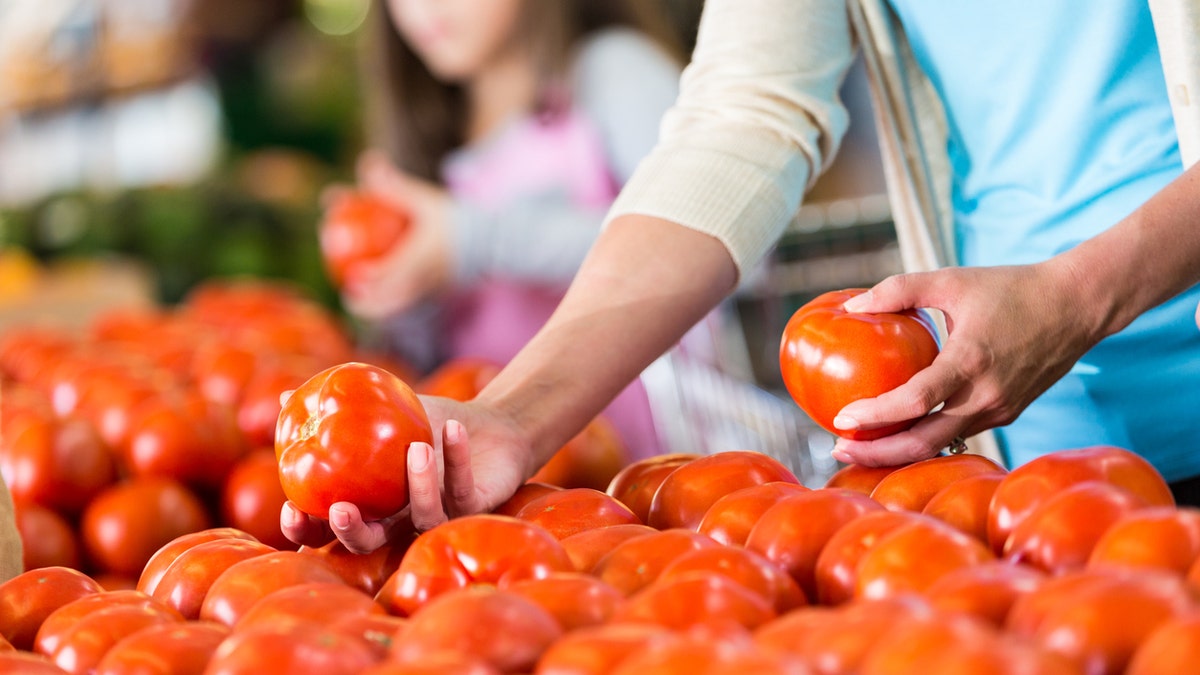
A woman is handling fresh tomatoes at a supermarket or local grocery store. Her daughter is also choosing vegetables in the background, adding depth and context to the image. (iStock)
Bite into a supermarket tomato and you'll probably notice something missing: taste. Scientists think they can put the yum back into the grocery tomato by tinkering with its genetic recipe.
Researchers are reinstalling five long-lost genetic traits that add much of the sweet-yet-acidic taste that had been bred out of mass-produced tomatoes for the past 50 years. They're using mostly natural breeding methods, not genetic modification technology.
"We know what's wrong with modern tomatoes and we have a pretty good idea how to fix it," said University of Florida horticultural scientist Harry Klee , co-author of a study in Thursday's journal Science.
CHICAGO GROCERY CHAIN SUED FOR ALLEGEDLY DISCRIMINATING AGAINST OLDER EMPLOYEES
Yield of tomatoes has tripled since 1960, but there's been a slow decline in taste quality as tomatoes have been bred for size and sturdiness at the expense of flavor. Klee said a tastier supermarket tomato could be ready within three years.
"Nobody deliberately set out to make tomatoes that don't have flavor," Klee said. "Basically it was a process of neglect."
One key issue is size. Growers keep increasing individual tomato size and grow more per plant. The trouble is that there is a limit to how much sugar each tomato plant can produce. Bigger tomatoes and more of them means less sugar per tomato and less taste, Klee said.
So Klee and colleagues looked at the genomes of the mass-produced tomato varieties and heirloom tomatoes to try to help the grocery tomatoes catch up to their backyard garden taste.
Good tiny heirloom tomatoes "are like eating candy," said New York University nutrition professor Marion Nestle, who wasn't part of the study. "For people who care about how food tastes, it's a very big deal."
Klee isolated some sugar genes and ones that were more geared to pure taste, but figured those won't work as well because they clash against growers' shipping and size needs. So he found areas that affect the aroma of tomatoes but not size or heartiness. Reintroducing those into mass-produced tomatoes should work because smell is a big factor in taste, he said.
FOR THE LATEST FOOD FEATURES FOLLOW FOX LIFESTYLE ON FACEBOOK
Altering genes in a lab would make the process faster, but because of consumer distrust and regulations, Klee is opting for natural breeding methods — with help from an electric toothbrush to spread pollen. He's not quite there yet, but is close.
Jose Ordovas, a nutrition professor at Tufts University, applauds the work, but cautions: "It is possible that some traits are not compatible and you cannot make the plant to behave exactly the way that you want."
Reggie Brown of growers' Florida Tomato Committee praised the study, saying it could help make supermarket tomatoes taste better.
No matter how much tinkering scientists do to mass-produced tomatoes, picking them too early and refrigerating them can make them bland. And consumers do have to be willing to pay more to have fresher, unrefrigerated tomatoes, said Klee, who generally doesn't do the taste testing in his lab.
"I don't like raw tomatoes very much at all. You know, I'm kind of tired of them," he said.




















